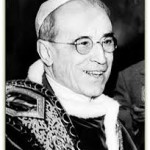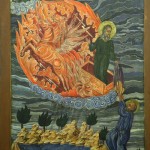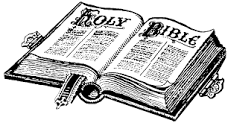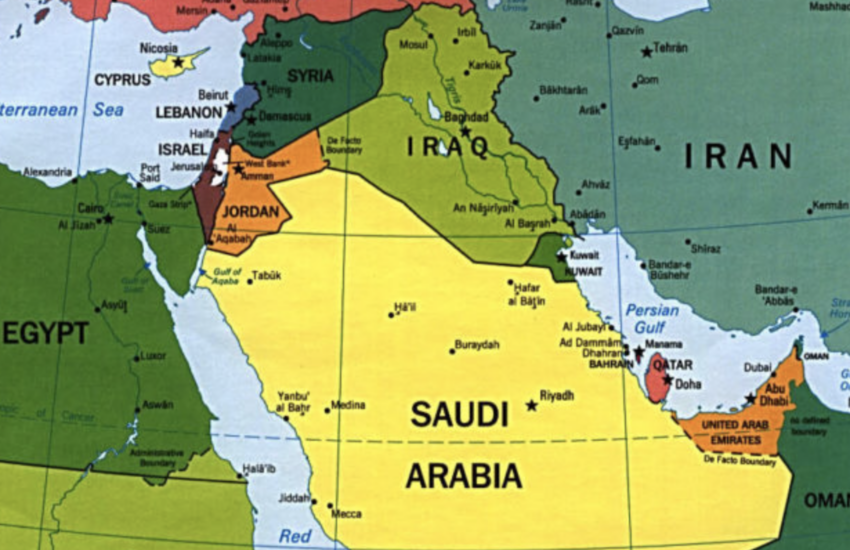How We Got The Bible Part 4
Did the Church try to keep Scripture secret in order to control people?
To believe this is to disregard the fact that there is absolutely no evidence in nearly 2000 years of Christianity in which the Church has taught something that is contrary to Scripture. If the Church was trying to hide some biblical fact in order to manipulate Christians, there would be some sort of smoking gun by now. After all, thousands of exceptionally skilled theologians, Bible scholars, historians and teachers have had full access to the entire Bible as well as a nearly endless supply of Vatican documents for hundreds of years. Yet you cannot point to one Catholic doctrine and honestly claim that it is contradicted in the Bible.
What about the common people who lived from A.D. 33 until about 1500? How did they learn the Bible? They learned it just like those in the apostolic age, through oral recitation. Since the very first days of Christianity, the Bible has been an essential and venerated part of the Mass. In fact, the general form of the Mass does not appear to have changed since the apostolic age. How do we know this? By writings from the early Christians as well as by the persecutors of the early Christians. Let me explain:
As you know, the Roman Empire did all they could to stamp out Christianity after Christ’s resurrection. In doing so, they tried to learn how to identify Christians, locate them and suppress them. In writings from one Roman subject named Pliny the Younger, we see how the Romans were gathering their intelligence on the early Christians. Pliny the Younger was in charge of tracking Christians down, interrogating them and suppressing them. He wrote to Trajan, the Emporer in Rome in about A.D. 111, in an effort to tell them how he was doing this, so they could be more efficient and effective. Pliny wrote:
“…they were accustomed to meet on a fixed day before dawn and sing responsively a hymn to Christ as to a god, and to bind themselves by oath, not to some crime, but not to commit fraud, theft, or adultery, not falsify their trust, nor to refuse to return a trust when called upon to do so. When this was over, it was their custom to depart and to assemble again to partake of food…”
St. Justin Martyr was an early Christian who lived a few years later than Pliny the Younger. Their ages overlapped, so it is quite possible their paths even crossed. The interesting thing is that we can compare Pliny the Younger’s account with Justin Martyr’s and get a very good picture of the religious practices of the very first Christians from two very different perspectives.
St. Justin Martyr attempted to explain Christianity to the pagan emperor, just as Pliny the Younger had, but he did so with a little more detail. In his First Apology of St. Justin Martyr, 155 A.D., he wrote:
“And this food is called among us Eukaristia [the Eucharist], of which no one is allowed to partake but the man who believes that the things which we teach are true, and who has been washed with the washing that is for the remission of sins, and unto regeneration, and who is so living as Christ has enjoined. For not as common bread and common drink do we receive these; but in like manner as Jesus Christ our Savior, having been made flesh by the Word of God, had both flesh and blood for our salvation, so likewise have we been taught that the food which is blessed by the prayer of His word, and from which our blood and flesh by transmutation are nourished, is the flesh and blood of that Jesus who was made flesh. For the apostles, in the memoirs composed by them, which are called Gospels, have thus delivered unto us what was enjoined upon them; that Jesus took bread, and when He had given thanks, said, “This do ye in remembrance of Me, this is My body;” and that, after the same manner, having taken the cup and given thanks, He said, “This is My blood;” and gave it to them alone… And on the day called Sunday, all who live in cities or in the country gather together to one place, and the memoirs of the apostles or the writings of the prophets are read, as long as time permits; then, when the reader has ceased, the president verbally instructs, and exhorts to the imitation of these good things. Then we all rise together and pray, and, as we before said, when our prayer is ended, bread and wine and water are brought, and the president in like manner offers prayers and thanksgivings, according to his ability, and the people assent, saying Amen; and there is a distribution to each, and a participation of that over which thanks have been given…”
As you can see, from both Pliny the Younger (a pagan) and St. Justin Martyr (a Catholic), Catholics have held scripture in the highest esteem, since the New Testament was written down. Additionally, you can see that since the turn of the very first century, A.D., Scripture has held a central role in the Mass, which is the nourishment of the Catholic faith. The only aspect of Catholicism that can be considered more essential than the Word is the actual body, blood, soul and divinity of Christ, which is the Eucharist. But again, through St. Justin Martyr, you can see that the Eucharist and the Word have been central to the Mass since the apostolic age.
Does the Catholic Church consider Tradition more important than Scripture?
Of the 10 common myths regarding Catholicism and the Bible, the one that is the most difficult to refute is that The Church has many teachings (Traditions) that have no relation to the Bible. This is not difficult to refute because of the lack of facts to support Catholicism, but because of the abundance of facts. The fact is, there is so much proof of Catholic teachings in the Bible, it is hard to touch on all of them. If I had to pick any Catholic teaching that seemed to have less than abundant biblical foundation, it would be the assumption of the Virgin Mary. As you may know, Catholics had believed in the assumption for centuries before Pope Pius XII definitively pronounced the doctrine on November 1, 1950. Why did the Church wait nearly 1,950 years to make this doctrine? Because until that time the truth had been accepted and recognized by the vast majority of Catholics.
Once Pius XII made the pronouncement, critics pounced. This is because the Bible has absolutely no account of Mary’s assumption into heaven. And as I mentioned at the beginning of this really long blog, a lot of non-Catholics believe in “Bible Alone”, or in other words, “if it ain’t in the Bible, it is fiction”. Well, I hate to burst the “Bible Alone” tradition’s bubble, but “Bible Alone” isn’t in the Bible. Therefore, it makes “Bible Alone” nothing more than man-made tradition, and a very weak one at that.
Also, the assumption of Mary does have biblical roots. Again, let me explain:
Marian doctrine could be a blog all its own. In fact, this blog is much longer than the average blog already, which is why I’ve broken it down into 4 parts, but you have to remember that the Bible is an extremely old and extremely long set of books. Therefore, I feel okay about the fact that this blog is of epic length. So let’s get back to the Assumption of Mary.
God is omnipotent, right? That means He can move mountains, save the world and actually create the world before He saves it. So, let’s look at some of the lessor things he did as shown in the Bible. He created time. He created humans. He caused barren women to bear children. He raised gave sight to the blind, cause the lame to walk and raised the dead. So is it impossible to comprehend that Mary was assumed into heaven? I think not. And there is biblical precedence for the Assumption.
Elijah is assumed into heaven in II Kings 2:11. Is one assumption the maximum or is it insufficient? What I’m asking is whether something about Elija’s assumption somehow makes any other assumption impossible? Does any singular occurrence in the Bible mean that a second occurrence outside the confines of the Bible is impossible?

Well, Pope Pius XII did not think so, and neither do I. Actually, history shows us that few people think that one biblical event precludes any other similar event thereafter. For instance, many people still think rainbows have some sort of spiritual significance. It is the same with crosses, flames, keys and white doves as well as other biblical symbols.
My point is that God, who is all-powerful, chose to assume Elijah into heaven. Is it such a stretch that he also chose to assume the obedient and contemplative Blessed Virgin into heaven as well? After all, she was the Mother of God and played a central role in salvation history as the new Ark of the Covenant and the New Eve. I mean,

Elijah was a phenomenal prophet and pure servant of God, but Mary played an even more important part of making sure that the Son of God actually became man and saved the entire world. It was Mary who said, “Yes”.
But Elijah is not the only one with biblical evidence of being assumed into heaven. Moses joined Elijah at Christ’s Transfiguration, which tells us that he too, was assumed as well. Then in Revelation 11:19 through 12:17, we have Mary, also with her physical human body, appearing in heaven. So we know that Elijah was assumed, we see him standing with Moses at the Transfiguration and then we read St. John’s account of Mary in heaven with her body and her soul.
Early Christians believed in Mary’s assumption, the belief remained constant and accepted into the 20th century and we have biblical evidence to support the historical belief of all Christians.
As I said, this could go on, but I believe it is time to wrap it up. After all, this blog is about the Bible, not Marian doctrine. I just wanted to point out that even with a difficult doctrine like the Assumption of Mary, we can find biblical roots.
This is because the Bible is inspired, inerrant and profitable for doctrine, for reproof, for correction and for instruction in righteousness. (2 Tim 3:16) And we can say this because of the Catholic Church. But “profitable” does not mean “sole”, “ultimate”, or “definitive”. In his omnipotence, God knew that we mere mortals would continue to require guidance in all truth, so he gave us two things, the Church and the Holy Spirit to guide the Church. (Matthew 16:18-19 and John 13:16) We see the amazing power of the Holy Spirit starting in Acts 2 and it has not stopped since that time. Christ never said, “I’m leaving you a book so you can just follow the directions all on your own. Make sure you get one when it is in print”.
If you are serious about your faith, truth matters to you. If you care about the truth, you need to accept the import role the Catholic Church has played in protecting the Bible all these years. Then you have to ask yourself why your ministers, Sunday school teachers and your fellow non-Catholic Christians have chosen to withhold this truth from you for so long. Maybe you have always thought the Church has intentionally withheld the Bible from Catholics. If so you probably concluded that the Catholic Church was corrupt for doing so. Well, now you see that there are people in your denomination who have withheld the truth from you. Are you going to continue trusting the other stuff they say or are you going to investigate the Catholic Church through fair and unbiased sources?




